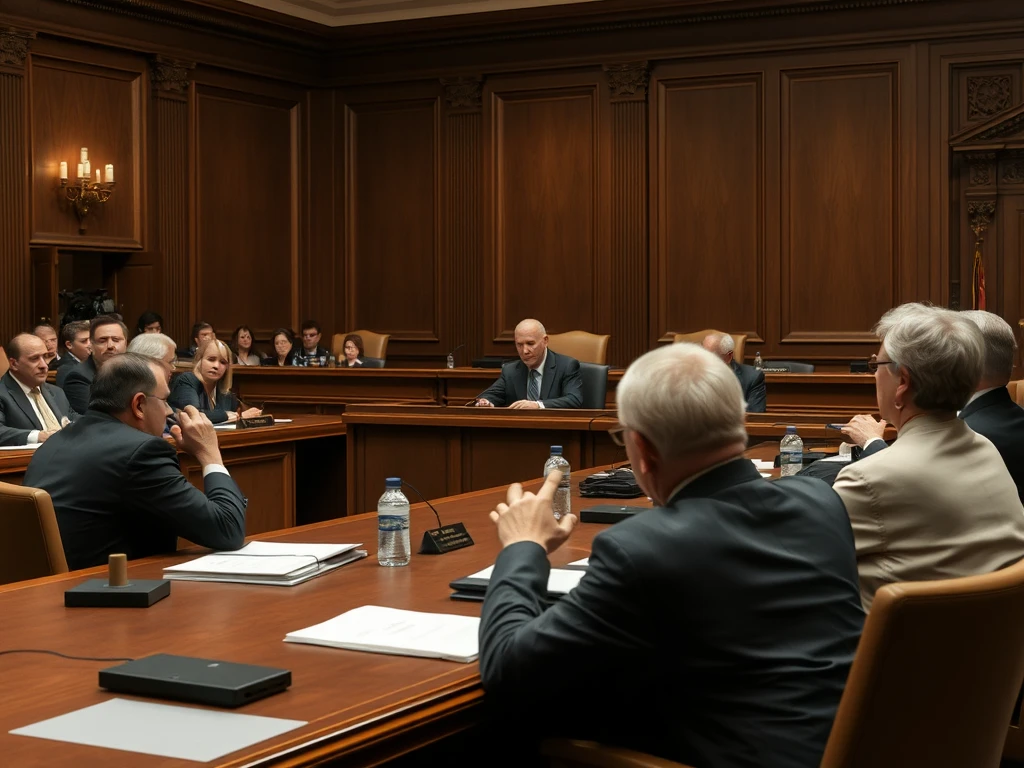Critical CFTC Nominee Brian Quintenz Dodges Bipartisan Question in Senate Hearing

The world of crypto regulation is watching closely as President Trump’s pick for Commodity Futures Trading Commission (CFTC) chair, Brian Quintenz, navigates the confirmation process. His recent Senate hearing brought key issues to the forefront, particularly his stance on maintaining political balance at the agency and how he views the evolving landscape of crypto regulation.
Brian Quintenz Addresses Senators on Crypto
During a recent Senate hearing, former CFTC commissioner Brian Quintenz, President Trump’s nominee to lead the agency, fielded a range of questions from lawmakers. Senators probed his views on prediction markets, his personal experiences with ‘debanking’ in the crypto industry, and his potential approach to leading the CFTC.
A central point of discussion, however, revolved around the political composition of the commission itself.
The Bipartisan Question and CFTC Balance
Senators Tina Smith and Raphael Warnock specifically asked Brian Quintenz whether he would recommend to President Trump that the CFTC maintain a balance of both Democratic and Republican commissioners. Under current law, no more than three commissioners can belong to the same political party.
Quintenz did not directly answer the question about actively pushing for bipartisanship, instead focusing on his past experience at the agency. This response was noted as ‘disappointing’ by Senator Smith. The potential makeup of the CFTC is significant, as it is one of the primary U.S. financial regulators poised to play a major role in overseeing digital assets, especially if new legislation passes.
Crypto Regulation and Potential CFTC Authority
The hearing also touched upon how the CFTC might handle increased authority over digital assets. Brian Quintenz indicated that the agency would likely need more resources and staff if Congress grants it expanded power, such as through the proposed CLARITY Act being considered in the House.
He discussed the regulatory challenges posed by decentralized crypto assets and blockchain technology. Quintenz stated, “I do believe that if Congress decides to give authority to the CFTC to regulate spot digital commodity markets exclusively, with clarity, I think the CFTC is more than up for that mandate and that mission.”
Experiencing Debanking in the Crypto Industry
Senator Tommy Tuberville asked Brian Quintenz about his experiences with ‘debanking’ – the practice of financial institutions denying services to crypto-related businesses. Drawing from his time at venture capital firm Andreessen Horowitz after leaving the CFTC in 2021, Quintenz shared a specific example:
- His firm encountered difficulties making investments.
- Small teams they wanted to fund couldn’t even receive a check.
- The reason was their inability to open bank accounts simply because they were in the crypto industry.
This anecdote highlighted a real-world challenge faced by legitimate businesses operating in the digital asset space.
Potential Conflicts of Interest for the Trump Nominee
As is standard practice for nominees, Brian Quintenz has disclosed his financial positions, including investments in cryptocurrency and market firms. These holdings could present potential conflicts of interest if he is confirmed as CFTC chair. Quintenz has pledged to resign from relevant positions and divest from certain assets within 90 days of confirmation to mitigate these concerns.
Summary: What the Senate Hearing Revealed
The Senate hearing for Brian Quintenz provided insight into his potential priorities and challenges if confirmed as CFTC chair. While he expressed confidence in the agency’s ability to regulate digital commodity markets under a clear mandate, his avoidance of a direct answer on actively supporting a bipartisan commission left some lawmakers unsatisfied. His personal experience with debanking also underscored the practical regulatory hurdles faced by the crypto industry. The path forward for his nomination and the future structure of the CFTC remain key points of interest for anyone involved in crypto regulation.







